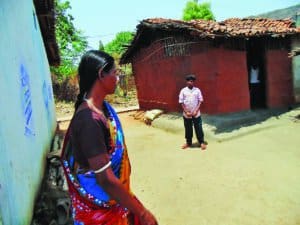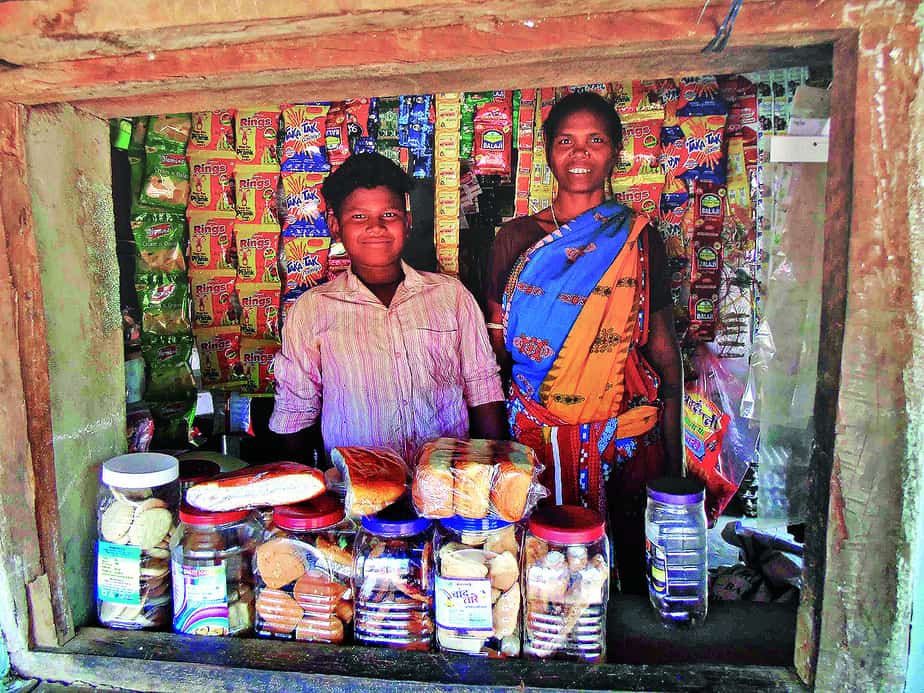Importance of the release certificate upon being rescued from bonded labour is exemplified by the impact it has had on this family’s living
Bina Manjhi is among the lucky few to receive their Release Certificates (RCs) after being rescued from bonded labour. This critical document also enables her to receive R20,000 of the initial rehabilitation fund.
With this money, she has got back her plot of land in Kalahandi’s Sandharpur village that she had put as collateral for a loan she took from a local. She also set up a grocery store where she stacks rice, potatoes, pulses, breads, biscuits, chips, and cold drinks. She bought the stock using R10,000 of the money she received, and now makes R2,000 every week from the shop.
Bina wants to start cultivating her land again but has to wait for the rains to start sowing seeds. Her 12-year-old son Rohit, who had gone with his mother to the brick kiln factory in Tamil Nadu, now wants to become a farmer when he gets older. Currently, he works as a drummer in wedding processions and gets paid R400 per day.
Their journey to reach this half-way decent situation has been a long one. Bina, who lost her husband a few years ago, worked as a daily wage labourer to sustain the family. Her youngest son too did odd jobs to help run the home. But with having to give her land away for the loan she took for her elder son’s marriage, and the mounting economic pressure, Bina was an easy target for recruiters who sniff out such desperation.
This recruiter is not from their village. In the cases Patriot has seen, most aren’t from the village of the labourers they recruit. They instead survey different areas, even getting tip-offs on whom to target.
Bina was promised an advance of R20,000 by a local sardar (local name of a recruiter) which she never got. She, her son and other labourers made their way to Kanta Banji railway station with the sardar, from where they were taken by some other men to Tamil Nadu.
This station, in Bolangir district, is a hotbed for migration of bonded labour, with at least two cases last year of police getting tipped off and stopping workers from boarding trains. The district, along with Kalahandi and Koraput, forms the most backward region of the country called the KBK belt, as assessed by the Planning Commission.

Trains regularly leave this station for Hyderabad, a journey of a little over 800 km; other routes take passengers to destinations in Gujarat and Maharashtra. (Bina says that the local sardars make at least R2,000 for every labourer they recruit.)
Upon arriving at the factory, Bina repeatedly asked for what was promised to her, but was always shunted away, the supervisor even threatening her. After some time, her son was put to work, porting bricks from one spot to another. But weekly, the mother-son duo received only a paltry R200, less than the stipulated daily wage — for every 1000 bricks the TN government has put the minimum wage as R255.05, while for porting it would be R85 per day. They had no way to quit, being confined to the grounds of the factory. Only Rohit was ever allowed to go for grocery shopping, once a week; likewise, one person from every family was allowed out with the seth — or his people — keeping watch.
This went on for a couple of months till the Thiruvallur revenue division got word of the factory and the condition of its labourers. Then, Bina says, the factory boss and his henchmen bribed her with R5,000 hoping she would give a glowing review about the circumstances at the workplace, which she flatly refused.
Luckily, she was able to speak to a woman from the team and tell her about everything that was going on there. With the rescue all ready to take place, the owner didn’t want to go down without a fight, and beat up the labourers, threatening to find them if they left and have them killed.
But Rohit along with another child were instrumental in testifying against the seth of the factory and his cohorts, and about the conditions at the factory, all of which together amount to bonded labour.
Thankfully, their ordeal was over in a few months. In this case, 147 persons were rescued on March 14 from the brick kiln in Thiruvallur district of Tamil Nadu. Apart from 63 women who made up that number, there were also 31 children, rescued by district revenue officials from violence and appalling conditions at the RNI Brick Kiln. The labourers were confined to the premises for the past four months after being paid advances ranging from R17,000 to R21,000.
In Bina’s case, even the promised advance was not given. When she returned home, she accosted the recruitment agent, who got unnerved when confronted. He paid her the balance she was owed after deducting the measly pay she received every week and gave her R6,000 within a few days of the face-off.
With the Union government increasing the rehabilitation of rescued bonded labourers in May 2016 under the ‘Central Sector Scheme for Rehabilitation of Bonded Labourers, 2016’ the hopes of the oppressed were raised. The government’s promise to tackle this modern-day slavery by 2030, rescuing and rehabilitating 18.4 million labourers, seemed to be getting a positive action with the increased financial assistance from R20,000 to one lakh per adult male rescued, R2 lakh for women and special category beneficiaries such as children or those rescued from organised and forced begging rings or other forms of forced child labour and then R3 lakh for women in cases of bonded or forced labour involving extreme cases of deprivation or marginalisation.
This R20,000 comes through immediately upon release and handing over of release certificates. The state government can get the reimbursement by the Centre. The rest of the fund disbursement, however, will happen only when the accused are convicted.
And the conviction rate is unsurprisingly extremely low, considering the odds stacked against people who migrate in search of work, leaving their land and support systems behind.
This report is part of NFI’s National Media Award Programme





